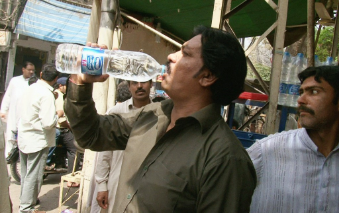By Enda Graig
Smoking causes cancer
Cigarettes contain chemicals which, when inhaled in small doses, on a continual basis over an extended period of time dramatically increases your potential of developing life threatening cancer. This is now an accepted medical fact which our Government insists is displayed, in capital letters, on all for sale cigarette packaging. You are given a severe warning concerning the inherent dangers - the rest is up to you.
Trihalomethanes (THMS) causes cancer
Drinking water, which contains THMs, when either ingested or inhaled through steam in small doses on a continual basis over an extended period of time will dramatically increase your potential of developing cancer and other health problems. There is a large body of high-level medical research which now believes this to be true.
This has been happening in the drinking water supplies in seventeen treatment plants throughout Donegal. Greencastle displays the highest reading of THMs of them all in a water analysis test taken in August 2015.
Irish Water and indeed the HSE would have you believe the threat of these chemicals is inconclusive. However, what they don't tell you is that there are recommended limits and these limits have been and continue to be exceeded. In the case of Greencastle it is twice the recommended limit.
Neither Irish Water or the HSE issue any warnings to the public. They categorically refuse stating that trihalomethane exceedance is not a significant health hazard. Unsuspecting public, including the able-bodied, the feeble, children and infants are all consuming the contaminated water.
Daily Mail, March2, 2016
Similar incident, different response
The response to a similar contamination in Derbyshire, England in March this year was in marked contrast when Severn Trent Water contacted customers to warn them not to drink the tap water due to excess chlorination in the reservoir.
See Daily Mail March 12, 2016 "Hundreds of families still without water a day after chlorine contamination triggered warning to thousands not to drink from taps"
"More than 200 homes in Derbyshire and Leicestershire are still without water a day after locals were warned not to drink, bathe of 'wash their toilets' with it.
Severn Trent Water warned as many as 3,700 customers across the counties not to use their tap water because higher than normal chlorine levels were detected in a reservoir.
It announced today that the 'majority of customers' are now able to use water as normal but 227 properties are still at risk.
Severn Trent said in a statement: 'As our network gets back to normal there may be times when your water supply is interrupted or you have discoloured water. "
Rathmullan Doctor's warning in DonegalDaily
Please read Dr John Carnie's ( Consultant Anesthetist ) article on Rathmullans drinking water supply, in DonegalDaily, Nov 20, 2014
"DOCTOR SAYS TOWN’S WATER SUPPLY IS NOT FIT TO DRINK"
"The retired anaesthetist claims that along with many other homes in Rathmullan, he has been in receipt of hazardous water since 2009 and no remedial action has been undertaken in the last five years.
The main complaint refers to the presence of THMs (Trihalomethanes) in drinking water in the area. Meanwhile the EU Commission says the elimination of all THMs remains a priority for the EPA."










